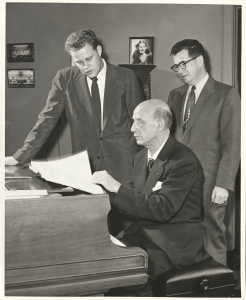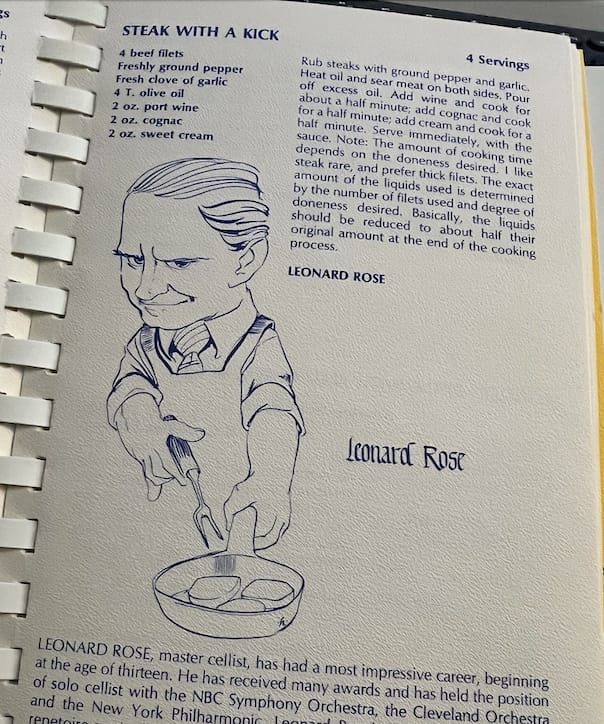- Gathering Note
- Posts
- Omar’s Journey is a new milestone for the Quad City Symphony
Omar’s Journey is a new milestone for the Quad City Symphony

For over a century, the Quad City Symphony Orchestra (QCSO) has stood as a cultural gem nestled between the major Midwestern cities of Chicago, Minneapolis, Milwaukee, and St. Louis, just a few blocks from the banks of the Mississippi River. Throughout the 20th century, as musicians, soloists, and orchestras embarked on regional tours, the QCSO often served as a strategic and welcoming stop. It provided a platform for artists en route to more renowned venues, enriching the local cultural scene and solidifying the orchestra’s role as a significant hub in the Midwest’s music circuit. This legacy helped foster a deep tradition, making the QCSO a cherished institution in the region.
One of my most treasured keepsakes from this era with the QCSO is their cookbook titled Standing Ovations. It’s a quintessential Midwest cookbook, filled with hearty recipes and straightforward preparations. What truly makes it a keeper, however, are the contributions from the QCSO’s frequent guest artists, such as baritone Robert Merrill (Cheese Pancakes), cellist Leonard Rose (Steak With a Kick), and the Contiguglia Brothers piano duo (Fusilli with Creamy Zucchini), among others.

The Quad Cities’ central location in the Midwest also made it an attractive destination for conductors seeking to build their careers. James Dixon, the longest-serving music director, led the orchestra for more than three decades while teaching at the University of Iowa. Dixon trained under the volcanic Dimitri Mitropoulos and became an unexpected champion of contemporary music, a passion he brought to both the University of Iowa and the QCSO.
After Dixon’s retirement, the baton passed to a new generation of QCSO conductors. Among them was Gustav Meier, whose brief tenure as an artistic advisor marked a transitional phase for the orchestra. It was during Meier’s time with the QCSO that I began to pay attention to classical music. Meier introduced me to Stravinsky, in a taut performance of Petrushka that leaned into the work’s sharp rhythms and incisive phrases. It also served as a perfect introduction to the piece for a newcomer like me. Only later did I appreciate the significance of having a conductor of Meier’s caliber. Trained by Hans Swarowsky and a teacher of prominent conductors like Marin Alsop, Jun Märkl, Yakov Kreizberg, John Mauceri, and Carl St. Clair, Meier’s connection to the QCSO became a source of pride whenever I saw his name mentioned in other conductors’ biographies.
The QCSO’s tradition of excellence has also been shaped by its innovative and thoughtful programming. Larger orchestras, with longer seasons, have the luxury of curating extensive repertoires that include groundbreaking new works and rarely performed pieces alongside beloved classics by Brahms, Beethoven, and Mahler. By contrast, the QCSO’s more compact schedule requires music directors to be especially deliberate in their selections, balancing the familiar with the fresh and surprising.
Since 2008, Mark Russell Smith has served as the QCSO’s music director, excelling at this balancing act. A prime example is the opening concert of the 2024/2025 season, which featured an eclectic mix of styles, eras, and themes with works by Mozart, Ruth Gipps, and Bruckner. The concert began with Mozart’s Magic Flute Overture, a lively and familiar piece that sets a charming tone. Bruckner’s Seventh Symphony, particularly its profound Adagio, explored spiritual and existential themes, expanding on Mozart’s magical motifs with a late-Romantic grandeur. Between these two works, Gipps’ Oboe Concerto introduced a lesser-known voice from the 20th century, which showcases the oboe’s lyrical capabilities against Gipps’ darker, ambiguous orchestral backdrop.
Under Russell Smith’s leadership, the QCSO has tackled ambitious projects, including large symphonies by Mahler, Shostakovich, Bruckner and even the daunting fugue from Charles Ives’ Fourth Symphony, while also championing lesser-known works by canonical composers and programing pieces by leading contemporary voices like Jessie Montgomery, John Adams, Bright Sheng, and Michael Abels.
Abels’ orchestral music has been a frequent highlight of the QCSO’s programming. His partnership with the orchestra stems from a long-standing friendship with Russell Smith, dating back to their grade school years. In recent seasons, the QCSO has performed several of Abels’ works, including his Guitar Concerto and Liquify, both commissioned by the orchestra. Their latest collaboration, Omar’s Journey, is scheduled for performances on February 1st and 2nd.
The piece is an adaptation of Abels’ Pulitzer Prize-winning opera, Omar, which premiered at the Spoleto Festival in 2022. Spanning two acts, the opera tells the story of Omar Ibn Said, a highly educated Muslim scholar from West Africa who was captured and sold into slavery in the United States. Rhiannon Giddens was commissioned to write the opera. Giddens drew on Omar Ibn Said’s autobiography to shape the opera’s story, develop the libretto, and vocal elements. Abels joined as co-composer, orchestrating the score and enhancing key musical numbers. After the opera’s success, the Ojai Music Festival commissioned a reduced concert version: Omar’s Journey. The QCSO’s upcoming performance will mark only the second time the work has been performed.
While Abels is renowned for his work on Jordan Peele’s movies, including Get Out and Us, he has also achieved success on the concert stage. My first exposure to his music was through Global Warming, and a recording of the piece by Paul Freeman and the Chicago Sinfonietta. Global Warming, like Omar, buzzes with disparate musical influences that Abels combines to create music that is accessible yet sophisticated. Very brief excerpts from the opera reveal a similar musical landscape. Giddens’ popular style blends with Abels’ vibrant orchestration. Abels’ orchestration – with hymns, folk melodies, and world music bubbling throughout – complements the opera’s colloquial numbers and lyrical simplicity.
The upcoming performance of Omar’s Journey represents a milestone for the QCSO, continuing its legacy of innovation and artistic excellence. Over more than a century, the orchestra has thrived without the fanfare of larger markets, quietly building a reputation for exceptional performances and adventurous programming. Under Mark Russell Smith’s leadership, Omar’s Journey has the potential to become one of the most significant achievements in the QCSO’s history, further cementing its place in the Midwest’s musical landscape.